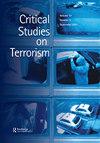The Burqa-clad woman, terror and the postcolony: the Kabul Beauty School and the art of imperial friendship and freedom
IF 2.5
Q2 POLITICAL SCIENCE
引用次数: 0
Abstract
ABSTRACT The Kabul Beauty School: The Art of Friendship and Freedom (2008) is a memoir written by the American beautician, Deborah Rodriguez. It recounts her individual story in Afghanistan after the fall of the Taliban and the work Western programs of “economic empowerment” and humanitarian agencies of “social emancipation” have done to “reconstruct” the war-torn nation. This involvement in the raw, however, does not exist in some kind of political vacuum. The leaders of these global programs of humanitarian action and “sustainable development” represent an array of neo-compradors: social enterprisers and partisan actors, selling “the burqa-clad woman” of Afghanistan the illusion of economic independence and “social emancipation” through local micro-projects and self-employment initiatives. The language of these agencies of social entrepreneurship and humanitarian service offers a wide-ranging discursive domain within which post-9/11 “counter-terroristic formations” (Boehmer and Morton 2010, 7) thrived in an explosion of distinct discursivities, taking form in pedagogy, morality, sexuality, medical care, philanthropy, beauty industry, women’s emancipation, human rights activism and international security and safety measures. These regimes of knowledge and expertise provide important sites of critical inquiry through which counter-terror can be conceptually subverted and discursively deconstructed as part of a larger system of global control and management, within which neo-liberal politics operate at the interface between the metropolis and the postcolony.身穿罩袍的妇女、恐怖和后殖民地:喀布尔美容学校和帝国友谊与自由的艺术
《喀布尔美容学校:友谊与自由的艺术》(2008)是美国美容师德博拉·罗德里格斯的回忆录。这本书讲述了她在塔利班倒台后在阿富汗的个人故事,以及西方的“经济赋权”计划和“社会解放”人道主义机构为“重建”这个饱受战争蹂躏的国家所做的工作。然而,这种原始的参与并不存在于某种政治真空中。这些全球人道主义行动和“可持续发展”计划的领导者代表了一群新买办:社会企业家和党派行动者,通过当地的微型项目和自营职业倡议,向阿富汗的“穿罩袍的妇女”兜售经济独立和“社会解放”的幻想。这些社会企业家和人道主义服务机构的语言提供了一个广泛的话语领域,在这个领域中,9/11后的“反恐组织”(Boehmer和Morton 2010, 7)在不同话语的爆炸中蓬勃发展,在教育学、道德、性、医疗保健、慈善事业、美容业、妇女解放、人权行动主义和国际安全和安全措施方面都有体现。这些知识和专业知识的制度提供了重要的批判性探究场所,通过这些场所,反恐可以在概念上被颠覆,并在话语上被解构,作为更大的全球控制和管理系统的一部分,在这个系统中,新自由主义政治在大都市和后殖民地之间的界面上运作。
本文章由计算机程序翻译,如有差异,请以英文原文为准。
求助全文
约1分钟内获得全文
求助全文

 求助内容:
求助内容: 应助结果提醒方式:
应助结果提醒方式:


